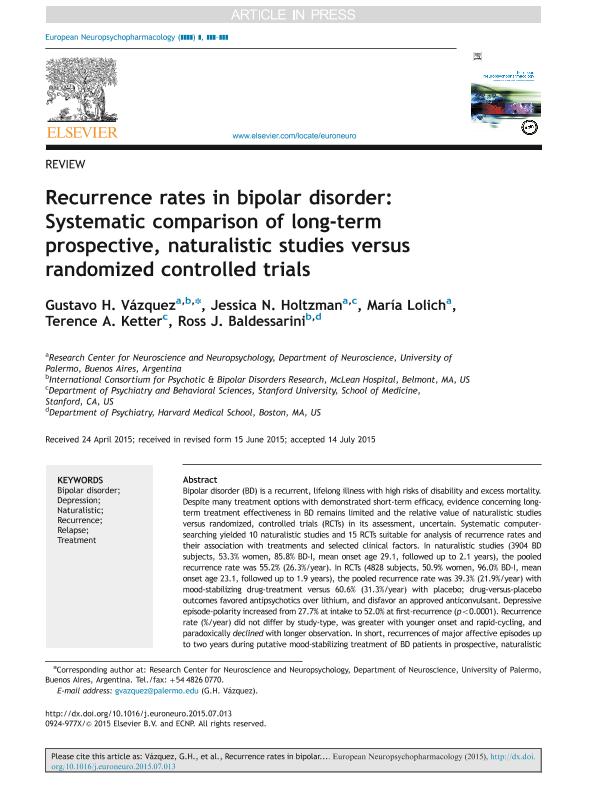Artículo
Recurrence rates in bipolar disorder: Systematic comparison of long-term prospective, naturalistic studies versus randomized controlled trials
Vázquez, Gustavo H.; Holtzman, Jessica N.; Lolich, Maria ; Ketter, Terence A.; Baldessarini, Ross J.
; Ketter, Terence A.; Baldessarini, Ross J.
 ; Ketter, Terence A.; Baldessarini, Ross J.
; Ketter, Terence A.; Baldessarini, Ross J.
Fecha de publicación:
10/2015
Editorial:
Elsevier Science
Revista:
European Neuropsychofarmacology
ISSN:
0924-977X
Idioma:
Inglés
Tipo de recurso:
Artículo publicado
Clasificación temática:
Resumen
Bipolar disorder (BD) is a recurrent, lifelong illness with high risks of disability and excess mortality. Despite many treatment options with demonstrated short-term efficacy, evidence concerning long-term treatment effectiveness in BD remains limited and the relative value of naturalistic studies versus randomized, controlled trials (RCTs) in its assessment, uncertain. Systematic computer-searching yielded 10 naturalistic studies and 15 RCTs suitable for analysis of recurrence rates and their association with treatments and selected clinical factors. In naturalistic studies (3904 BD subjects, 53.3% women, 85.8% BD-I, mean onset age 29.1, followed up to 2.1 years), the pooled recurrence rate was 55.2% (26.3%/year). In RCTs (4828 subjects, 50.9% women, 96.0% BD-I, mean onset age 23.1, followed up to 1.9 years), the pooled recurrence rate was 39.3% (21.9%/year) with mood-stabilizing drug-treatment versus 60.6% (31.3%/year) with placebo; drug-versus-placebo outcomes favored antipsychotics over lithium, and disfavor an approved anticonvulsant. Depressive episode-polarity increased from 27.7% at intake to 52.0% at first-recurrence (p<0.0001). Recurrence rate (%/year) did not differ by study-type, was greater with younger onset and rapid-cycling, and paradoxically declined with longer observation. In short, recurrences of major affective episodes up to two years during putative mood-stabilizing treatment of BD patients in prospective, naturalistic studies and RCTs were substantial and similar (26.3 vs. 21.9%/year). Episode-polarity shifted strongly toward depressive first-recurrences. These findings support the value of naturalistic studies to complement long-term RCTs, and add to indications that control of depression in BD remains particularly unsatisfactory.
Palabras clave:
Bipolar Disorder
,
Depression
,
Naturalistic
,
Relapse
Archivos asociados
Licencia
Identificadores
Colecciones
Articulos(SEDE CENTRAL)
Articulos de SEDE CENTRAL
Articulos de SEDE CENTRAL
Citación
Vázquez, Gustavo H.; Holtzman, Jessica N.; Lolich, Maria; Ketter, Terence A.; Baldessarini, Ross J.; Recurrence rates in bipolar disorder: Systematic comparison of long-term prospective, naturalistic studies versus randomized controlled trials; Elsevier Science; European Neuropsychofarmacology; 25; 10; 10-2015; 1501-1512
Compartir
Altmétricas



